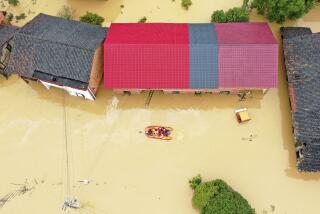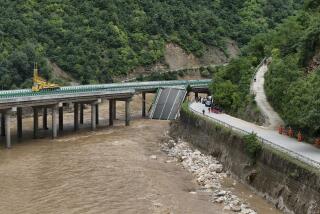China’s old ways shaken by quake
In a system with a centuries-long tradition of austere leaders laying down the law from behind their palace walls, China’s response to its worst natural disaster in three decades has revealed a nation in the throes of political change.
The China that emerged from the wreckage of Monday’s magnitude 7.9 earthquake in Sichuan province looked surprisingly modern, flexible and if not democratic, at least open. It has admitted foreign rescue experts into the disaster area and tolerated reporting by a more aggressive news media.
The leadership has appeared more responsive to the public, and the public in turn reacted with an outpouring of individual initiative to help out.
Premier Wen Jiabao, sounding much like a Western politician throughout the week, trudged through the mud, visited gut-wrenching scenes of collapsed schools and homes, and stroked the cheeks of crying children. Wen even echoed the words of the Bill Clinton who spoke of feeling others’ pain, as he told survivors, “Your pain is our pain.”
President Hu Jintao flew to the battered city of Mianyang on Friday to show support for victims. The trip appeared to go beyond the formulaic photo opportunity. It suggested a growing recognition by the government that public opinion matters and that the people should know what their leaders are doing, particularly in times of crisis. Instead of ordering people, the government is guiding them in a manner befitting a modern 21st century state.
“The Communist government is changing its ruling ideology to become more people-oriented,” said Huang Nanping, Marxism and Leninism professor at Peking University.
The Chinese people too have been intimately a part of the tragedy that has been brought into many of their homes through 24-hour television coverage. They’ve cheered together when children were rescued from under the rubble; more often they have cried when the dead were carried out.
There has been a crush of people wanting to volunteer in the disaster area in Sichuan -- so many that the government has worked to keep people away.
“I have faced the very real possibility I face death, but I have to help,” said Tong Rongan, 33, a volunteer who was sent through a mountaineering club to help in remote areas at higher altitudes. “All my friends, especially the doctors, are envious that I’m getting to go.”
Individual initiative
Within 72 hours after the earthquake, Chinese individuals and companies had raised nearly $200 million. In almost every neighborhood of Beijing, volunteers were seen collecting money.
At a blood donation van parked in front of a McDonald’s in downtown Beijing, volunteers had to turn away hundreds of prospective donors. The Beijing Municipal Health Bureau announced that all of the city’s blood banks were full.
“I feel like I want to give a piece of myself,” said 25-year-old Can Li, a caterer who said she also was on a waiting list to volunteer. “It’s not enough to give money.”
For centuries, China has operated under a top-down system. During the height of the Cultural Revolution, Mao Tse-tung ordered millions of city dwellers to the countryside, upending society and leaving scars that remain more than 30 years later. But since the 1990s, economic liberalization and a changing culture have placed far greater emphasis on the individual, creating an ever-tougher balancing act for a one-party state attempting to maintain control and stability.
Rising living standards and an increasingly willful middle class have shifted vitality and initiative to the private sector and individuals. Seeing disaster in their country, their every impulse is to head out to the scene with blankets, food, medicine and drinking water.
Their enthusiasm might be more helpful to the country’s cohesiveness than slogans about national unity and harmony.
“It’s wonderful to see young people working together like this. Nobody’s ordering them to do it. It is all voluntary,” said a retired doctor, Xiang Guichen, 73, who was strolling past the bloodmobile.
Together, she and her 74-year-old husband marveled at the scene, the hordes of well-dressed volunteers and a crowd that had gathered to watch news updates of the disaster on a three-story-high television screen affixed to the McDonald’s.
The couple are from northeast China and remember the earthquake in 1976 that killed more than 240,000 people there.
“Nobody knew anything of what was going on then . . . now we’re watching on the television eight hours a day,” Xiang said.
Also in evidence this week was a shift in the news media.
For decades, China’s reaction whenever there was a hint of trouble was to cordon off the affected area and squelch alternative views. The government this time made a fleeting effort to control the news media; an order went out Monday that Chinese outlets should not send reporters to the damaged areas and should take material only from the official news service. But the order was ignored, causing the government to loosen its expectations.
“This is such a big event that none of us would give up the opportunity to cover it,” said a Chinese journalist who asked not to be quoted by name.
Foreign journalists also witnessed a difference in the treatment and access provided by government officials.
“Journalists? Go right on through,” said a security official at a tollbooth on the road to Mianyang, waving through a foreign journalist. The security official also did not collect the toll fee.
At the county emergency relief center, government officials quickly provided statistics, handouts and interview opportunities.
A government that once put up with few challenges to its authority has taken the unusual step of fielding questions online from people about why thousands of schools that collapsed were not built to be quake-safe.
Another change has been admitting foreign experts to the disaster area. Initially the Chinese government said it would accept foreign aid, but not actual foreigners -- thank you very much. But on Friday, an elite team of earthquake experts arrived from Japan, soon to be followed by experts from South Korea and Singapore, as well as Taiwan. In the Chinese context, the quick reversal suggests that the usual game plan was overruled by leaders at the very top.
Lessons learned
“The government is absorbing lessons from each past crisis, generally part of a trial-and-error approach,” said Xiao Gongqin, professor at Shanghai Normal University. “We’re seeing the government learn from its mistakes and gradually become more open.”
Chinese leaders have had several opportunities recently to absorb such lessons.
Last year, there were the scandals about the safety of Chinese toys and food. A massive storm battered southern China in January and February just before Chinese New Year, leaving millions of angry, tired and hungry people struggling to get home during the most important holiday of the year. Chinese officials’ handling of protests in Tibet turned what was supposed to be one of their proudest moments, the relay of the Olympic torch from Athens to Beijing, into a transcontinental embarrassment.
In the last few weeks, the Chinese leadership watched its ally, Myanmar, turn a natural catastrophe into a public relations disaster. The military regime’s refusal to let in international aid created the impression that the Southeast Asian country’s rulers cared more for their jobs than for the lives of tens of thousands of cyclone victims.
China has had a huge incentive, and a big opportunity, to repair some of its damaged international prestige as it prepares to host the Olympics, which open Aug. 8 in Beijing. The Tibet crackdown, Beijing’s support for Sudan in the Darfur crisis, protests surrounding the Olympic torch relay, the xenophobia whipped up in response to foreign criticism and human rights campaigns by overseas activists have damaged China’s international reputation.
The destruction caused by natural disasters, for which the government bears limited responsibility, is far easier to address and respond to openly than political unrest, environmental devastation fueled by badly administered factories, corruption and other crises, situations in which Beijing tends to revert to its old ways.
A government rooted in authoritarianism and with the world’s largest army may be in a better position to marshal relief resources and manpower than a decentralized democracy.
“The Chinese government won a lot of credibility from the way they responded to the earthquake,” said Jing Jun, a sociologist at Tsinghua University.
“But whether this is a turning point to China becoming a democratic society, that is a long shot.”
--
--
mark.magnier@latimes.com
--
Gao Wenhuan of The Times’ Beijing Bureau contributed to this report.
More to Read
Sign up for Essential California
The most important California stories and recommendations in your inbox every morning.
You may occasionally receive promotional content from the Los Angeles Times.










